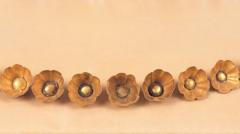The Sudan National Museum, previously a cornerstone of the nation's heritage, once showcased breathtaking artifacts from Nubian civilizations and significant Christian artworks. It served as a cultural hub for locals and tourists alike, drawing school children and hosting community events in its gardens. However, the onset of war two years ago drastically altered its fate.
With the Sudanese military regaining control over Khartoum from the Rapid Support Forces (RSF), the devastating aftermath of warfare is becoming evident. The National Museum, alongside governmental buildings and neighborhood banks, has endured substantial damage, revealing a grim picture of destruction. "They destroyed our identity, and our history," lamented Ikhlas Abdel Latif Ahmed, the director of museums at Sudan's National Corporation for Antiquities and Museums, during a recent interview.
The heart of Khartoum, where the museum is located, has become a shell of its former self. Upon inspection of the premises, museum staff found shattered glass, bullet casings, and signs of extensive looting. "The building was magnificent," Ahmed stated, recalling its glory days before the conflict began, "but the militia took so much from us, damaging countless unique collections."
Evidence of looting extends to other cultural institutions across Sudan, prompting UNESCO to issue warnings about the impending threat to Sudanese heritage, urging art dealers globally to refrain from handling possibly smuggled artifacts. Prior to the war, the National Museum was undergoing restoration, leaving many notable treasures stored, which may have facilitated their removal by thieves.
Officials suspect that valuable items have been exported to the United Arab Emirates for sale by RSF fighters, although concrete evidence remains elusive. The Sudanese government claims that significant amounts of gold have been shipped to the UAE during this tumultuous period. The fate of critical artifacts, including a gold collar from a royal pyramid, remains unknown, as Ahmed remarked, "Museum artifacts are invaluable, beyond imagination."
As Sudan seeks to reclaim its stolen heritage, the government plans to involve Interpol and UNESCO to assist in recovering artifacts. However, the obstacle of unrest looms large over the recovery efforts. The RSF’s actions are viewed by many as a direct assault on Sudan’s collective identity, a sentiment echoed by observers concerned about the implications of the ongoing looting.
Amgad Farid, a thinker at Fikra for Studies and Development, criticized the RSF’s targeting of the nation’s historical sites, implying a deliberate strategy to erase Sudan’s cultural footprint. This conflict has not only displaced millions but has also stripped the population of their historical connections, with nearly 13 million people forced to abandon their homes due to the violence.
In the face of destruction, Ahmed remains hopeful. "Inshallah, we will reclaim our heritage," she asserted, emphasizing a collective commitment to restore the National Museum to its former glory. As the war continues, the loss of Sudan's cultural fabric remains a poignant reminder of a heritage teetering on the brink of obliteration.




















